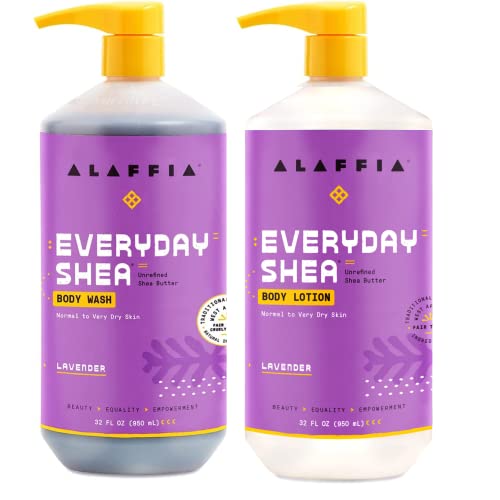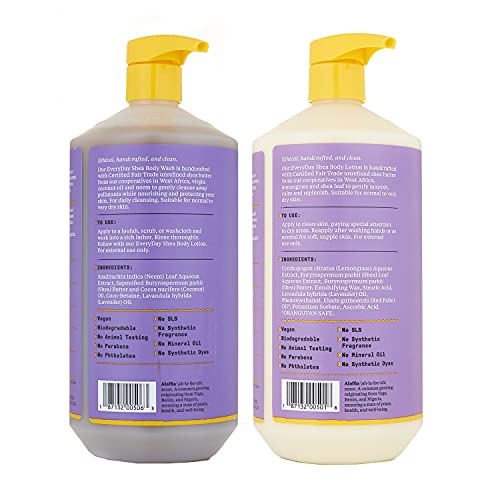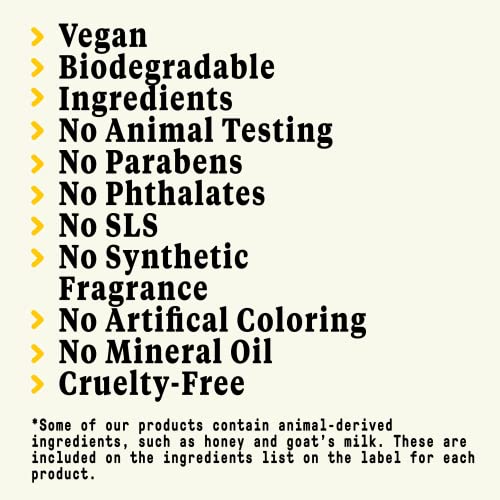





Alaffia EveryDay Shea Body Lotion Set - Moisturizes & Cleanses with Shea Butter & Lemongrass - 32oz


Cocamidopropyl Betaine
High RiskCocamidopropyl betaine is a synthetic surfactant derived from coconut oil, commonly used in personal care products for its mild cleansing and foaming properties. It functions as a surfactant, emulsifier, and thickening agent, contributing to the texture and performance of formulations.
Sustai Insights
Cocamidopropyl betaine offers functional benefits as a gentle surfactant, enhancing product foaming and texture. However, it may pose low to moderate allergenic risks and is subject to high use restrictions due to contamination concerns. Regulatory bodies have advised on its safe levels of usage, categorizing its risk level as high overall. Users should practice caution, particularly with sensitive populations, and consider alternatives like naturally derived surfactants for safer formulations.
Citrus Reticulata Leaf Oil
High RiskCitrus reticulata leaf oil is derived from the leaves of the mandarin orange tree. It is primarily used for its aromatic properties in personal care products, contributing to fragrance and sensory experiences.
Sustai Insights
Citrus reticulata leaf oil offers functional benefits as a natural fragrance component but has a high allergenic potential, raising concerns for sensitive individuals. It poses low risks for carcinogenicity and developmental toxicity, but regulatory restrictions exist due to its allergenic effects. Environmental risks include persistence and bioaccumulation. Overall, the risk level associated with this ingredient is high, and caution is advised in its use. Alternatives such as synthetic fragrances or other plant-derived oils may offer safer options.
Potassium Sorbate
Medium RiskPotassium sorbate is a potassium salt of sorbic acid, primarily used as a preservative in food and cosmetic products. It inhibits the growth of molds, yeast, and some bacteria, extending the shelf life of products. It is commonly found in various formulations due to its effectiveness and low toxicity.
Sustai Insights
Potassium sorbate serves as an effective preservative, preventing microbial growth in food and cosmetic products, which is vital for safety and longevity. Although it has a low risk of carcinogenicity and developmental toxicity, there is a moderate concern regarding allergies and immunotoxicity. Environmentally, it poses minimal risks as it is not significantly bioaccumulative. Regulatory agencies have verified its use, although some products may face restrictions. Overall, it is assessed as a medium risk ingredient, with safe usage practices recommended, and alternatives such as natural preservatives could be considered.
Emulsifying Wax
Medium RiskEmulsifying wax is a mixture derived from plant and synthetic sources, primarily used to stabilize emulsions in cosmetic and personal care products. Its primary function is to blend oil and water-based ingredients, ensuring a uniform consistency and enhancing product texture.
Sustai Insights
Emulsifying wax offers functional benefits as an effective emulsifier, helping to create stable formulations in cosmetic products. It generally poses low health risks, with minimal concerns regarding carcinogenicity and allergenic potential. Environmental risks are also low, with no significant pollutant or bioaccumulation issues. However, use restrictions exist, and irritation potential is noted for sensitive skin. Regulatory assessments indicate it is safe for use within established concentration limits, leading to an overall moderate risk assessment. Alternatives like plant-based emulsifiers may offer sustainable options.
Limonene
Medium RiskLimonene is a scent ingredient and solvent naturally found in citrus fruits, commonly used in personal care and cleaning products for its fragrant properties. It serves as a flavoring agent and enhances the overall sensory experience of products.
Sustai Insights
Limonene offers functional benefits such as acting as a solvent and fragrance enhancer. However, it carries a high allergenic potential, which can trigger skin or respiratory sensitivities in some individuals. Environmental concerns include moderate persistence and bioaccumulation, along with potential ecotoxicity. Regulatory restrictions necessitate verification in products containing this ingredient. Overall, the risk level is assessed as medium, emphasizing the importance of cautious use, particularly for sensitive populations. Safer alternatives may be considered to mitigate these risks.
Unspecified Botanical Oil(s)
Medium RiskUnspecified botanical oils are natural extracts derived from various plant sources, commonly used in cosmetic and personal care products for their moisturizing, emollient, and fragrance properties. These oils can serve multiple functions, including enhancing product texture and providing skin benefits.
Sustai Insights
Unspecified botanical oils offer functional benefits such as moisturizing and emollient properties, contributing positively to product texture. Sustainability can be affirmed if sourced ethically. Health risks are low for carcinogenicity, allergies, and reproductive toxicity. Environmental concerns are minimal; however, regulatory bodies advise cautious use. Overall, the ingredient has a medium risk level, and users should consider alternatives like specific plant oils with established safety profiles.
Phenoxyethanol
Medium RiskPhenoxyethanol is a preservative used in cosmetics and personal care products to prevent microbial growth and extend shelf life. It is commonly found in formulations such as lotions, creams, and serums.
Sustai Insights
Phenoxyethanol serves effectively as a preservative, ensuring product stability and safety by inhibiting microbial growth. It is considered to have low health risks regarding carcinogenicity, allergies, and reproductive toxicity. However, moderate use restrictions exist, and regulatory bodies have advised caution in specific applications. Environmental concerns include its potential as a pollutant, although it is not highly bioaccumulative. Overall, the ingredient presents a medium risk level, with safe usage practices recommended and alternative preservatives available for those seeking greener options.
Vanilla Planifolia (Vanilla) Fruit Extract
Low RiskVanilla planifolia (vanilla) fruit extract is derived from the fruit of the vanilla plant. It is commonly used for its aromatic properties and as a flavoring agent in various products, including food, cosmetics, and personal care items.
Sustai Insights
Vanilla fruit extract offers functional benefits such as flavor enhancement and fragrance. It is sustainably sourced with low environmental impact and exhibits low risk for carcinogenicity and developmental toxicity. However, it may cause skin irritation in some individuals and has low to moderate allergenic potential. Regulatory bodies have not imposed significant restrictions, leading to an overall low risk assessment. Safe usage practices should be observed, and alternatives include synthetic vanillin for those seeking more stable options.
Palm Stearic Acid
Low RiskPalm stearic acid is a fatty acid typically derived from palm oil, commonly used in cosmetic and personal care products as an emulsifier and thickening agent. It assists in stabilizing formulations and improving texture, providing a smooth consistency in creams and lotions.
Sustai Insights
Palm stearic acid is effective as an emulsifier, contributing to product stability and texture. It is derived from renewable palm oil, which can be sustainably sourced. Health risks are low, with minimal concerns regarding carcinogenicity, allergies, or reproductive toxicity. Environmental risks are also low, as it is not known to be a pollutant or bioaccumulative. Regulatory bodies have not issued restrictions on its use. Overall, the ingredient presents a low risk profile, making it a viable choice in product formulations.
Cocos Nucifera (Coconut) Oil
Low RiskCocos Nucifera (Coconut) Oil is derived from the kernels of the coconut palm. It is primarily used in cosmetic formulations for its emollient and moisturizing properties, making it suitable for skin and hair care products.
Sustai Insights
Coconut oil serves as an effective moisturizer and emollient, promoting skin hydration and softness. It is sustainably sourced and biodegradable. Health risks are minimal, with low concerns regarding carcinogenicity, allergens, and reproductive toxicity. Environmental impact is also low, as it does not contribute significantly to pollution or bioaccumulation. Regulatory bodies have not issued restrictions on its use. Overall, coconut oil presents a low risk for health and environmental concerns, making it a safe ingredient in cosmetic products.
Ascorbic Acid (Vitamin C)
Low RiskAscorbic acid (Vitamin C) is a naturally occurring antioxidant essential for various biological functions, including collagen synthesis and immune response. It is commonly used in cosmetic and food products for its preservative properties and ability to enhance skin brightness.
Sustai Insights
Ascorbic acid provides functional benefits as an effective antioxidant and preservative, contributing to skin health and product stability. It is generally recognized as safe with low health risks, including minimal concerns for carcinogenicity and allergies. Environmentally, it poses low risks, as it is biodegradable and does not bioaccumulate. Regulatory bodies like the FDA have not imposed significant restrictions on its use. Overall, the ingredient presents a low risk, with safe usage practices ensuring consumer safety, and alternatives such as natural extracts exist for those seeking different formulations.
Sucrose
Low RiskSucrose is a naturally occurring disaccharide, commonly known as table sugar. It is derived from various plants, primarily sugar cane and sugar beet, and serves as a sweetening agent in a variety of food and cosmetic products.
Sustai Insights
Sucrose is effective as a sweetener and humectant, providing moisture retention in formulations. It is biodegradable and generally recognized as safe, with low concerns regarding carcinogenicity, allergies, and reproductive toxicity. However, excessive consumption can lead to health issues like obesity and diabetes. Environmentally, sucrose poses minimal pollution risk and is not bioaccumulative. Regulatory bodies do not impose significant restrictions on its use. Overall, sucrose presents a low risk when utilized appropriately.
Butyrospermum Parkii (Shea) Butter
Low RiskButyrospermum parkii (shea) butter is a vegetable fat derived from the nuts of the shea tree. It is commonly used in cosmetic formulations for its emollient properties, providing moisture and improving skin texture. Additionally, shea butter is known for its ability to enhance the stability of products and deliver a creamy texture.
Sustai Insights
Shea butter offers functional benefits as an effective moisturizer, enhancing skin barrier function and texture. It is sustainably sourced and biodegradable, contributing to eco-friendliness. Health-wise, it is associated with low risks for carcinogenicity, allergies, and reproductive toxicity. Environmental impacts are minimal, with no significant pollutant potential identified. Regulatory assessments indicate no current restrictions. Overall, the ingredient presents a low risk, making it a favorable choice in cosmetic formulations.
Potassium Sorbate
Medium RiskPotassium sorbate is a potassium salt of sorbic acid, primarily used as a preservative in food and cosmetic products. It inhibits the growth of molds, yeast, and some bacteria, extending the shelf life of products. It is commonly found in various formulations due to its effectiveness and low toxicity.
Sustai Insights
Potassium sorbate serves as an effective preservative, preventing microbial growth in food and cosmetic products, which is vital for safety and longevity. Although it has a low risk of carcinogenicity and developmental toxicity, there is a moderate concern regarding allergies and immunotoxicity. Environmentally, it poses minimal risks as it is not significantly bioaccumulative. Regulatory agencies have verified its use, although some products may face restrictions. Overall, it is assessed as a medium risk ingredient, with safe usage practices recommended, and alternatives such as natural preservatives could be considered.
Cocamidopropyl Betaine
High RiskCocamidopropyl betaine is a synthetic surfactant derived from coconut oil, commonly used in personal care products for its mild cleansing and foaming properties. It functions as a surfactant, emulsifier, and thickening agent, contributing to the texture and performance of formulations.
Sustai Insights
Cocamidopropyl betaine offers functional benefits as a gentle surfactant, enhancing product foaming and texture. However, it may pose low to moderate allergenic risks and is subject to high use restrictions due to contamination concerns. Regulatory bodies have advised on its safe levels of usage, categorizing its risk level as high overall. Users should practice caution, particularly with sensitive populations, and consider alternatives like naturally derived surfactants for safer formulations.
Vanilla Planifolia (Vanilla) Fruit Extract
Low RiskVanilla planifolia (vanilla) fruit extract is derived from the fruit of the vanilla plant. It is commonly used for its aromatic properties and as a flavoring agent in various products, including food, cosmetics, and personal care items.
Sustai Insights
Vanilla fruit extract offers functional benefits such as flavor enhancement and fragrance. It is sustainably sourced with low environmental impact and exhibits low risk for carcinogenicity and developmental toxicity. However, it may cause skin irritation in some individuals and has low to moderate allergenic potential. Regulatory bodies have not imposed significant restrictions, leading to an overall low risk assessment. Safe usage practices should be observed, and alternatives include synthetic vanillin for those seeking more stable options.
Palm Stearic Acid
Low RiskPalm stearic acid is a fatty acid typically derived from palm oil, commonly used in cosmetic and personal care products as an emulsifier and thickening agent. It assists in stabilizing formulations and improving texture, providing a smooth consistency in creams and lotions.
Sustai Insights
Palm stearic acid is effective as an emulsifier, contributing to product stability and texture. It is derived from renewable palm oil, which can be sustainably sourced. Health risks are low, with minimal concerns regarding carcinogenicity, allergies, or reproductive toxicity. Environmental risks are also low, as it is not known to be a pollutant or bioaccumulative. Regulatory bodies have not issued restrictions on its use. Overall, the ingredient presents a low risk profile, making it a viable choice in product formulations.
Cocos Nucifera (Coconut) Oil
Low RiskCocos Nucifera (Coconut) Oil is derived from the kernels of the coconut palm. It is primarily used in cosmetic formulations for its emollient and moisturizing properties, making it suitable for skin and hair care products.
Sustai Insights
Coconut oil serves as an effective moisturizer and emollient, promoting skin hydration and softness. It is sustainably sourced and biodegradable. Health risks are minimal, with low concerns regarding carcinogenicity, allergens, and reproductive toxicity. Environmental impact is also low, as it does not contribute significantly to pollution or bioaccumulation. Regulatory bodies have not issued restrictions on its use. Overall, coconut oil presents a low risk for health and environmental concerns, making it a safe ingredient in cosmetic products.
Citrus Reticulata Leaf Oil
High RiskCitrus reticulata leaf oil is derived from the leaves of the mandarin orange tree. It is primarily used for its aromatic properties in personal care products, contributing to fragrance and sensory experiences.
Sustai Insights
Citrus reticulata leaf oil offers functional benefits as a natural fragrance component but has a high allergenic potential, raising concerns for sensitive individuals. It poses low risks for carcinogenicity and developmental toxicity, but regulatory restrictions exist due to its allergenic effects. Environmental risks include persistence and bioaccumulation. Overall, the risk level associated with this ingredient is high, and caution is advised in its use. Alternatives such as synthetic fragrances or other plant-derived oils may offer safer options.
Ascorbic Acid (Vitamin C)
Low RiskAscorbic acid (Vitamin C) is a naturally occurring antioxidant essential for various biological functions, including collagen synthesis and immune response. It is commonly used in cosmetic and food products for its preservative properties and ability to enhance skin brightness.
Sustai Insights
Ascorbic acid provides functional benefits as an effective antioxidant and preservative, contributing to skin health and product stability. It is generally recognized as safe with low health risks, including minimal concerns for carcinogenicity and allergies. Environmentally, it poses low risks, as it is biodegradable and does not bioaccumulate. Regulatory bodies like the FDA have not imposed significant restrictions on its use. Overall, the ingredient presents a low risk, with safe usage practices ensuring consumer safety, and alternatives such as natural extracts exist for those seeking different formulations.
Sucrose
Low RiskSucrose is a naturally occurring disaccharide, commonly known as table sugar. It is derived from various plants, primarily sugar cane and sugar beet, and serves as a sweetening agent in a variety of food and cosmetic products.
Sustai Insights
Sucrose is effective as a sweetener and humectant, providing moisture retention in formulations. It is biodegradable and generally recognized as safe, with low concerns regarding carcinogenicity, allergies, and reproductive toxicity. However, excessive consumption can lead to health issues like obesity and diabetes. Environmentally, sucrose poses minimal pollution risk and is not bioaccumulative. Regulatory bodies do not impose significant restrictions on its use. Overall, sucrose presents a low risk when utilized appropriately.
Emulsifying Wax
Medium RiskEmulsifying wax is a mixture derived from plant and synthetic sources, primarily used to stabilize emulsions in cosmetic and personal care products. Its primary function is to blend oil and water-based ingredients, ensuring a uniform consistency and enhancing product texture.
Sustai Insights
Emulsifying wax offers functional benefits as an effective emulsifier, helping to create stable formulations in cosmetic products. It generally poses low health risks, with minimal concerns regarding carcinogenicity and allergenic potential. Environmental risks are also low, with no significant pollutant or bioaccumulation issues. However, use restrictions exist, and irritation potential is noted for sensitive skin. Regulatory assessments indicate it is safe for use within established concentration limits, leading to an overall moderate risk assessment. Alternatives like plant-based emulsifiers may offer sustainable options.
Limonene
Medium RiskLimonene is a scent ingredient and solvent naturally found in citrus fruits, commonly used in personal care and cleaning products for its fragrant properties. It serves as a flavoring agent and enhances the overall sensory experience of products.
Sustai Insights
Limonene offers functional benefits such as acting as a solvent and fragrance enhancer. However, it carries a high allergenic potential, which can trigger skin or respiratory sensitivities in some individuals. Environmental concerns include moderate persistence and bioaccumulation, along with potential ecotoxicity. Regulatory restrictions necessitate verification in products containing this ingredient. Overall, the risk level is assessed as medium, emphasizing the importance of cautious use, particularly for sensitive populations. Safer alternatives may be considered to mitigate these risks.
Unspecified Botanical Oil(s)
Medium RiskUnspecified botanical oils are natural extracts derived from various plant sources, commonly used in cosmetic and personal care products for their moisturizing, emollient, and fragrance properties. These oils can serve multiple functions, including enhancing product texture and providing skin benefits.
Sustai Insights
Unspecified botanical oils offer functional benefits such as moisturizing and emollient properties, contributing positively to product texture. Sustainability can be affirmed if sourced ethically. Health risks are low for carcinogenicity, allergies, and reproductive toxicity. Environmental concerns are minimal; however, regulatory bodies advise cautious use. Overall, the ingredient has a medium risk level, and users should consider alternatives like specific plant oils with established safety profiles.
Phenoxyethanol
Medium RiskPhenoxyethanol is a preservative used in cosmetics and personal care products to prevent microbial growth and extend shelf life. It is commonly found in formulations such as lotions, creams, and serums.
Sustai Insights
Phenoxyethanol serves effectively as a preservative, ensuring product stability and safety by inhibiting microbial growth. It is considered to have low health risks regarding carcinogenicity, allergies, and reproductive toxicity. However, moderate use restrictions exist, and regulatory bodies have advised caution in specific applications. Environmental concerns include its potential as a pollutant, although it is not highly bioaccumulative. Overall, the ingredient presents a medium risk level, with safe usage practices recommended and alternative preservatives available for those seeking greener options.
Butyrospermum Parkii (Shea) Butter
Low RiskButyrospermum parkii (shea) butter is a vegetable fat derived from the nuts of the shea tree. It is commonly used in cosmetic formulations for its emollient properties, providing moisture and improving skin texture. Additionally, shea butter is known for its ability to enhance the stability of products and deliver a creamy texture.
Sustai Insights
Shea butter offers functional benefits as an effective moisturizer, enhancing skin barrier function and texture. It is sustainably sourced and biodegradable, contributing to eco-friendliness. Health-wise, it is associated with low risks for carcinogenicity, allergies, and reproductive toxicity. Environmental impacts are minimal, with no significant pollutant potential identified. Regulatory assessments indicate no current restrictions. Overall, the ingredient presents a low risk, making it a favorable choice in cosmetic formulations.
Experience luxurious hydration with the Alaffia EveryDay Shea Body Lotion and Body Wash Bundle. Perfect for normal to very dry skin, this set features fair-trade unrefined shea butter combined with nourishing botanicals to cleanse and moisturize, leaving skin soft and supple.
- Deep Moisturization: Infused with shea butter and lemongrass, this lotion revitalizes dry skin, providing long-lasting hydration and soothing irritation.
- Gentle Cleansing: The sulfate-free body wash, enriched with neem and coconut oil, effectively cleanses without stripping natural moisture, ensuring skin feels fresh and renewed.
- Sustainable Sourcing: Committed to ethical practices, Alaffia sources ingredients from women-led cooperatives in West Africa, supporting education and healthcare initiatives.
- Natural Ingredients: Free from sulfates, parabens, and synthetic fragrances, this clean beauty duo is cruelty-free, promoting a healthier skincare routine.
- Daily Use: Ideal for everyday use, this bundle enhances skin’s health and appearance, making it a staple for anyone seeking effective personal care solutions.
Subscribe & Save with Sustai
- Best Price Guarantee: Always enjoy the lowest prices on sustainable home essentials.
- No Surprises: We’ll notify you before shipping. No hidden fees, ever.
- You’re in Charge: Change, pause, or cancel your subscription anytime with ease.
- Eco-Friendly Deliveries: Our grouped shipments mean less packaging and lower emissions.
Join us on a sustainable journey. Special offers for a limited time! Prices and promotions may change.
Recommended Products
Experience luxurious hydration with the Alaffia EveryDay Shea Body Lotion and Body Wash Bundle. Perfect for normal to very dry skin, this set features fair-trade unrefined shea butter combined with nourishing botanicals to cleanse and moisturize, leaving skin soft and supple.
- Deep Moisturization: Infused with shea butter and lemongrass, this lotion revitalizes dry skin, providing long-lasting hydration and soothing irritation.
- Gentle Cleansing: The sulfate-free body wash, enriched with neem and coconut oil, effectively cleanses without stripping natural moisture, ensuring skin feels fresh and renewed.
- Sustainable Sourcing: Committed to ethical practices, Alaffia sources ingredients from women-led cooperatives in West Africa, supporting education and healthcare initiatives.
- Natural Ingredients: Free from sulfates, parabens, and synthetic fragrances, this clean beauty duo is cruelty-free, promoting a healthier skincare routine.
- Daily Use: Ideal for everyday use, this bundle enhances skin’s health and appearance, making it a staple for anyone seeking effective personal care solutions.

You can have at most 2 Sustainable Steals products in your cart
Customer Reviews
Customers’ View
Customers generally appreciate the nourishing qualities of the Body Lotion and Body Wash Bundle, particularly noting the deep hydration provided by shea butter, which is beneficial for dry and sensitive skin. Many users highlight the natural ingredients, such as lemongrass and neem, as favorable for both skin health and environmental consciousness. However, some customers have expressed concerns about the product's consistency, with one reviewer finding the lotion too watery. Despite some mixed feedback, many value the ethical sourcing of ingredients, supporting fair trade practices and cruelty-free development. Overall, this bundle is recognized for its commitment to clean, effective personal care that aligns with eco-friendly values.
AI-generated from the text of customer reviewsThis product has no reviews yet.




